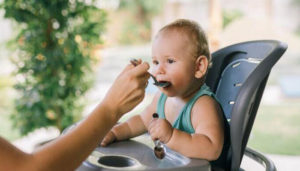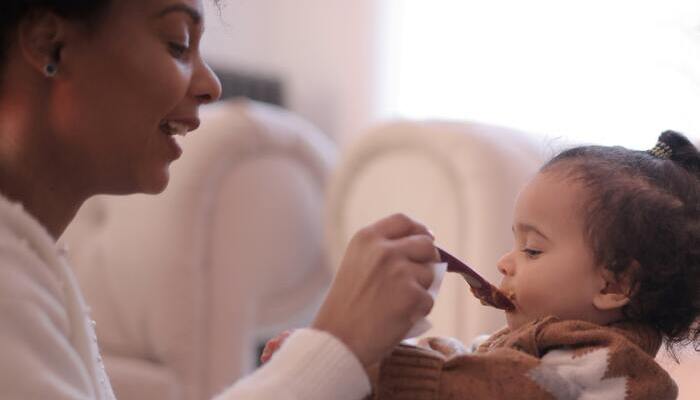A great number of minerals and vitamins are needed in the diet of humans small and large for proper development and function. Adults are capable of providing themselves with the right ingredients, but sometimes problems can arise with their babies.
Vitamins such as A, B, C, D, E, and K as well as minerals in the form of calcium, phosphorus, magnesium, iron, and zinc are absolutely essential for babies’ proper development and overall health.
We can’t dive deeply into each one in this post, so we’ll examine one of the most important elements, iron, using the example of one of the most popular foods in a baby’s diet – baby cereal.
Iron is one of the important minerals for babies. It helps with growth and development, and it plays a role in the production of red blood cells. That’s why infant cereal is often fortified with iron. But how much iron does your baby need? And is it safe to give them iron fortified baby cereal? In this blog post, we’ll answer all your questions about this subject!

Iron helps to support babies’ developing metabolism and nervous system. It’s naturally found in soil and in many foods. It’s an essential part of our diet. Babies need iron in their diet to stay healthy and grow properly. The body needs iron to make hemoglobin, which carries oxygen in the blood. Iron also helps the body use energy, store vitamins, and produce new cells.
There are two main forms of dietary iron: heme and non-heme. Heme iron, which makes up 40 percent of the iron in meat, poultry, and fish, is well absorbed. Non-heme iron, 60 percent of the iron in animal tissue, and all the iron in plants (fruits, vegetables, grains, nuts) is less well absorbed.
How much iron does my baby need? This is an important question for all parents to consider.
Did you know that the Recommended Dietary Allowance (RDA) for infants is at least 0.27 mg/day of iron? This number increases to 11 mg/day for children aged 7-12 months old. It is important to mention that these numbers are different for vegetarians and vegans.
Vegetarians require 1.8 times the Recommended Dietary Allowance (RDA) of nutrients than people who consume meat. This is due to the fact that meat contains heme iron that is not found in other food groups, such as vegetables.

Inadequate iron intake in babies may lead to a number of potential symptoms, including fatigue, paleness, and shortness of breath. Left untreated, iron deficiency can cause serious health problems.
Introducing solid foods to your baby can be exciting, but oftentimes they will only eat a few bites. Iron-fortified cereal is one of the best options to give them enough iron when you’re NOT feeding them dairy products and meats that are high in protein, which helps increase their need for this nutrient! For every four tablespoons of iron-fortified baby cereal, you can find at least 45% to 60% of your baby’s daily iron requirements.
Iron-fortified baby cereal is not recommended for babies who are being given infant formula because the two sources combined can potentially contribute too much iron to your child’s diet. And in the same way as a deficiency, excessive amounts have been shown to be problematic with developing babies – especially since they’re still growing!
The kind of iron found in baby cereal is non-heme, which is comparable with the iron found in plant-based foods. Iron is added to baby cereal for the purpose of helping you meet your little one’s daily needs. It has no effect on flavor or texture, so it’s perfect!
Iron-fortified baby cereal is unlikely to cause constipation in most babies. The type of iron used for this purpose burns easily, meaning that it can be quickly absorbed by the digestive tract and bypass any potential problems with digestion or absorption rates before they start.
As a parent, you could also consider boosting iron absorption. To help your baby absorb more iron from their food, give them foods that are rich in vitamin C, such as citrus fruits, tomatoes, or broccoli. You can also cook with cast-iron pans, which can add small amounts of iron to their food. Avoid giving your baby tea, which can inhibit iron absorption.

What are the substitutes for cereal for babies? What foods contain a lot of iron?
There are quite a few, although they require preparation that is more advanced than cereal preparation. Mashed beans and lentils will resemble the texture of cereal, so they can be an easy substitute for cereal for babies! In addition to being rich in nutrients like iron, they also provide zinc and folate which are essential when it comes time for babies’ most important developmental stage: toddlerhood.
Another product that we can use as a substitute is peeled and boiled/crushed potatoes and sweet potatoes. Potatoes are an excellent choice for a baby. They are easily digestible, delicate in taste, easy to prepare in many forms, and additionally, they are not allergenic. They can be the first vegetable for when you start to expand their diet at 6 months of age.
The third suggestion is a group of foods that can also be served as dessert. Of course, these are fruits. It is worth focusing on these three fruits: currants, strawberries, and raspberries. These colorful products not only taste good but also have an appealing color that can encourage your baby to eat them. 1 cup of raspberries contains 0.85mg of iron and 1 cup of strawberry has 0.62mg of iron.
There is a lot of information in this post, but please remember that too much of anything can be harmful. Be sure to talk to your doctor before starting your baby on any supplements! After all, what we want most is for our babies to be happy and healthy, which is why we spend so much time supporting their development!


















